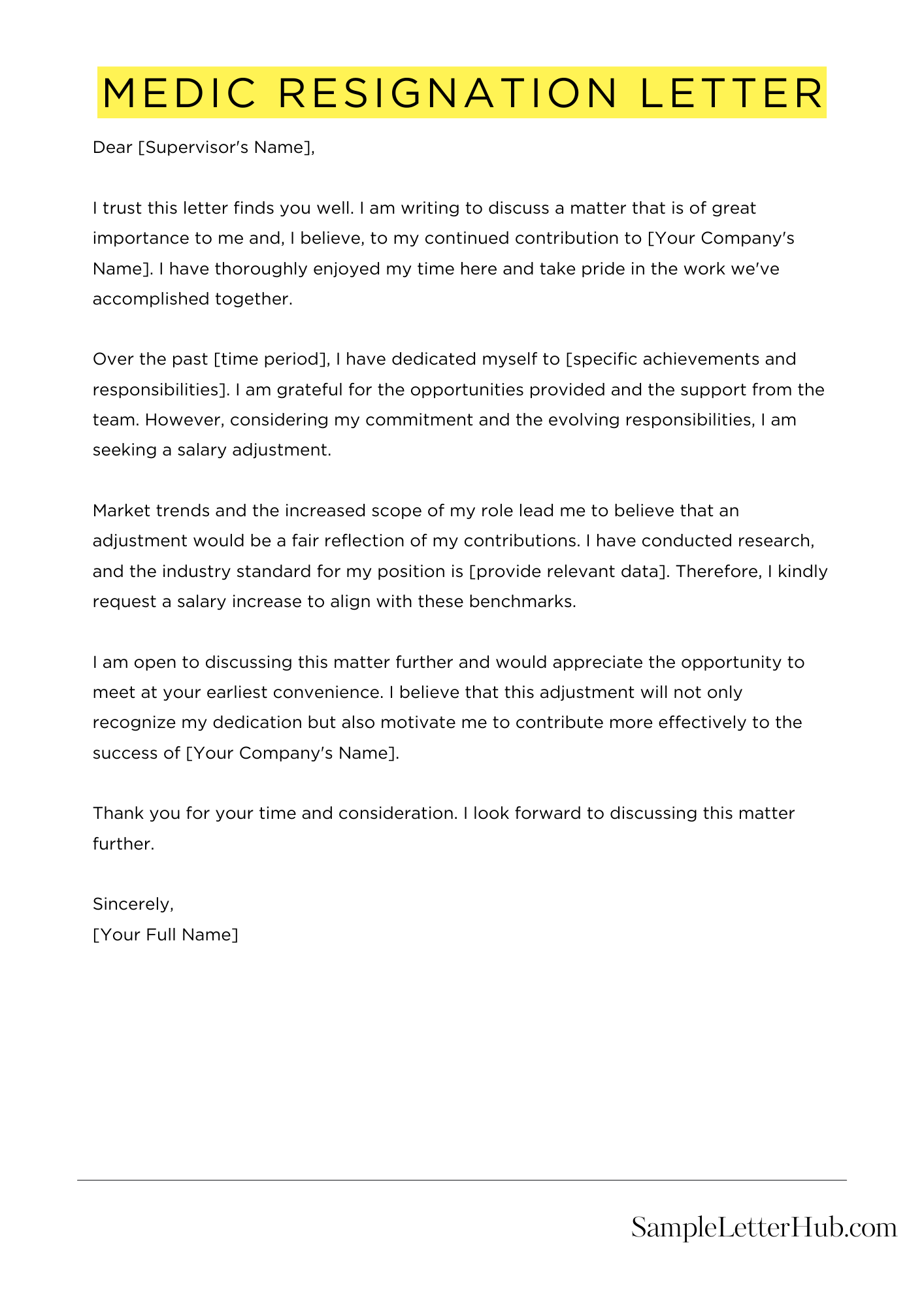In the medical field, writing a medic resignation letter is a crucial step when it’s time to move on. In this article, we’ll guide you through the process and share an example resignation letter to help you craft a clear and professional letter.
When it comes to leaving a job, a well-written resignation letter is essential. It’s your chance to express your gratitude, explain your reasons for leaving, and maintain a positive relationship with your employer. Remember to keep your tone polite and humble, even if you’re feeling frustrated or disappointed.
Below, we’ve included a template medic resignation letter that you can adapt to your specific situation. Feel free to use it as a starting point and tailor it to your needs. Remember, a well-crafted resignation letter can leave a lasting impression and help you transition smoothly to your next chapter.
Medic Resignation Letter
Dear [Recipient Name],
Please accept this letter as formal notification of my resignation from my position as a Medical Doctor at [Hospital/Clinic Name], effective two weeks from today, [Last Date of Employment].
During my tenure at [Hospital/Clinic Name], I have valued the opportunity to contribute to the well-being of our patients and the advancement of medical knowledge. I am grateful for the experiences and support I have received from my colleagues and supervisors.
I wish you and [Hospital/Clinic Name] all the best in the future.
Sincerely,
[Your Signature]
Short Medic Resignation Letter Sample
Please accept this letter as formal notification that I am resigning from my position as Medic at [Company Name]. My last day of employment will be [Your Last Day]. Thank you for the opportunity to grow and learn during my time here. I wish you and the company continued success. I am happy to assist in the transition process to ensure a smooth handover of my responsibilities.
I wish you all the best with your medic resignation letter.
When it’s time to say farewell, expressing your gratitude and best wishes can make the transition smoother:

How to Write a Medic Resignation Letter
1. Start with a Formal Introduction
Begin your letter with a formal salutation, such as “Dear [Supervisor’s Name].” Clearly state your intention to resign from your position as a medic, including the date your resignation will take effect.
2. Express Gratitude and Appreciation
Take a moment to express your gratitude for the opportunity to work as a medic within the organization. Highlight any specific experiences or individuals that have made your time there meaningful.
3. State Your Reasons for Leaving
While it’s not always necessary to provide detailed reasons for your departure, you may choose to briefly state your motivations for leaving. Keep it professional and avoid any negative or accusatory language.
4. Offer Assistance with the Transition
Demonstrate your commitment to a smooth transition by offering to assist in any way possible. This could include training your replacement or providing documentation on your responsibilities.
5. End with a Professional Closing
Conclude your letter with a formal closing, such as “Sincerely,” followed by your typed name. You may also include your contact information if you wish to remain available for any questions or support.
6 Frequently Asked Questions About Medical Resignation Letters
Medical professionals often face the difficult decision of resigning from their positions. To ensure a smooth transition, it’s crucial to craft a well-written resignation letter. Here are the six most frequently asked questions about medical resignation letters, along with expert answers:
1. What is the proper format for a medical resignation letter?
Medical resignation letters typically follow a formal business letter format. Include your name, address, date, the recipient’s name, their title, and the organization’s name. State your intention to resign, provide your last date of employment, and express gratitude for the opportunity.
2. How much notice should I give?
The standard notice period for medical professionals is two weeks. However, it’s advisable to provide as much notice as possible, especially if you hold a senior position or have specialized responsibilities.
3. What should I include in the body of the letter?
In the body of the letter, briefly state your reasons for resigning. Keep it professional and avoid negative comments. Offer to assist with the transition process and express your best wishes for the organization’s future.
4. Should I submit my resignation letter in person or via email?
It’s generally preferred to submit your resignation letter in person to your supervisor. However, if that’s not possible, you can email it. Be sure to follow up with a phone call to confirm receipt.
5. Can I negotiate my departure date?
In some cases, you may be able to negotiate your departure date. This is especially true if you’re willing to provide additional support during the transition period. However, it’s important to be flexible and understand that the organization’s needs may come first.
6. What should I do after submitting my resignation letter?
After submitting your resignation letter, maintain a positive and professional attitude. Continue to perform your duties diligently and assist with the transition process. It’s also a good idea to network with colleagues and update your resume and LinkedIn profile.
Before making the decision to resign from your job, it’s essential to consider the legal aspects:
Understanding your emotions after quitting your job is important. Explore why you might be feeling sad:
Related
- Resignation letter sample
- Forced resignation letter
- Resignation letter due to going abroad
- Resignation letter due to marriage
- Resignation letter due to other opportunity
- Resignation letter due to mistake

